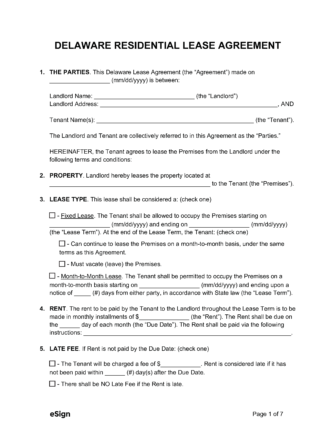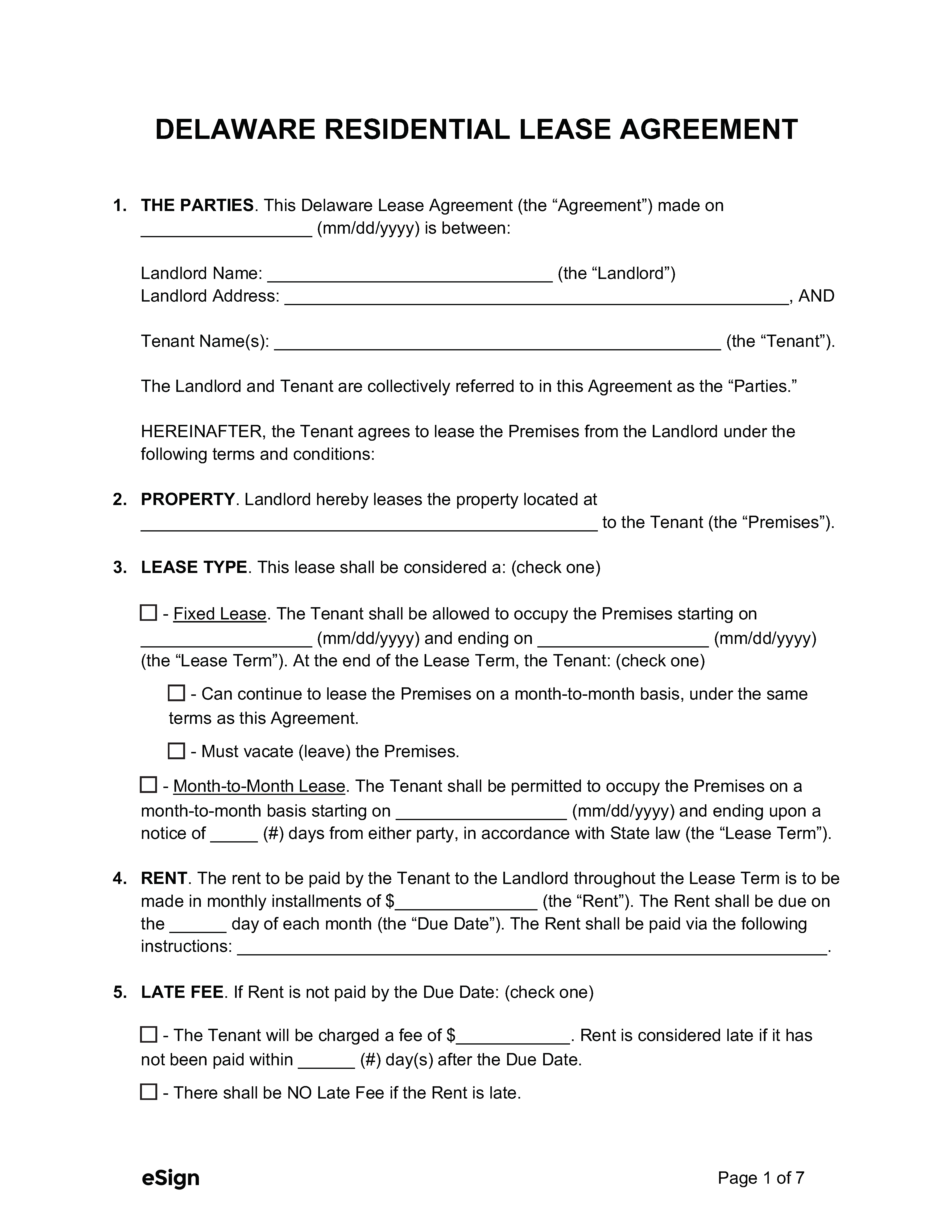
A Delaware lease agreement is a contract that spells out rental terms for a commercial or residential tenancy. Common lease components include the cost of rent, rental duration, late fees, notice requirements, and termination procedures. By recording these terms in a written lease, the parties protect themselves in case of disagreements or legal issues.
A Delaware lease agreement is a contract that spells out rental terms for a commercial or residential tenancy. Common lease components include the cost of rent, rental duration, late fees, notice requirements, and termination procedures. By recording these terms in a written lease, the parties protect themselves in case of disagreements or legal issues.
PDF Download
A Delaware lease agreement is a contract that spells out rental terms for a commercial or residential tenancy. Common lease components include the cost of rent, rental duration, late fees, notice requirements, and termination procedures. By recording these terms in a written lease, the parties protect themselves in case of disagreements or legal issues.
5 | 5 Ratings Downloads: 636
Rental Application – A form completed by potential tenants before signing a lease. The landlord will choose a worthy tenant by evaluating the personal, employment, and credit information relayed in the application form.
Maximum Amount ($) – For leases of one year or more , the maximum security deposit amount is one month’s rent if the property is unfurnished. However, there’s no security deposit limit for furnished units. [5]
Collecting Interest – Delaware has no laws that require landlords to pay tenants the interest they’ve earned while holding a security deposit.
Returning to Tenant – Security deposits must be returned by the landlord within 20 days of the end of the lease term . [7]
Itemized List Required? – Yes, if deductions are made to the deposit, an itemized list of the damages and expected repair costs must be given to the tenant when the landlord refunds their deposit. [8]
Separate Bank Account? – Yes, a separate bank account is required to hold the security deposit. [9]
General Access – At least 48 hours’ notice must be given to tenants before a landlord can access the property. [10]
Immediate Access – Landlords have the right to enter the property in an emergency without providing notice to the tenants. [11]
Grace Period – Tenants have five days to pay rent before late fees apply. If the landlord’s office is not in the same county as the rental property, they must wait three more days before charging late fees . [12]
Maximum Late Fee ($) – A late payment fee cannot exceed 5% of the monthly rent. [13]
Bad Check (NSF) Fee – A $40 fee may be charged to the tenant for writing a bad check. [14]
Withholding Rent – If the landlord fails to supply services required by law for more than 48 hours after receiving notice, the tenant can keep two-thirds of their rent, divided proportionally for each day the problem exists. [15]
Non-Payment of Rent – Landlords must give tenants a 5-day notice once the rent payment is overdue. [17]
Non-Compliance – A 7-day notice must be sent to the tenant if they’ve committed a correctable lease violation. [18]
Lockouts – Preventing a tenant from gaining access to their rental unit is only allowed with a court order. [19]
Leaving Before the End Date – If a tenant decides to move out before the lease naturally expires, the landlord must try to re-rent the property to someone else. The tenant will be responsible for paying rent until the lease term ends or the landlord fills the vacancy. [20]
Month-to-Month Tenancy – A month-to-month lease agreement can be terminated with a 60-day notice to quit. [21]
Unclaimed Property – When an evicted tenant leaves personal items in a rental unit, the landlord must store the property for seven days at the tenant’s expense. Failure to retrieve the belongings and cover the storage fees within this time frame will result in the property being deemed abandoned. [22]